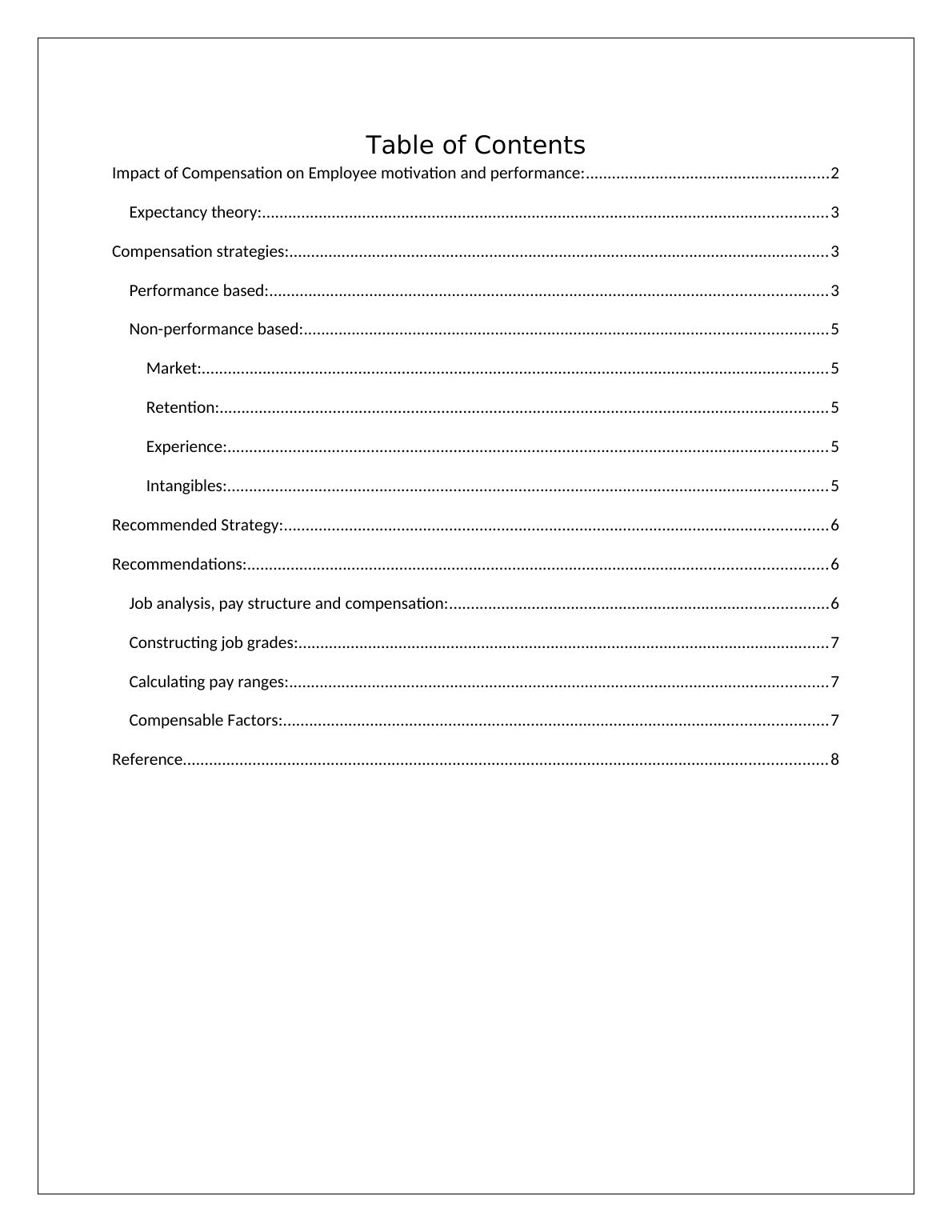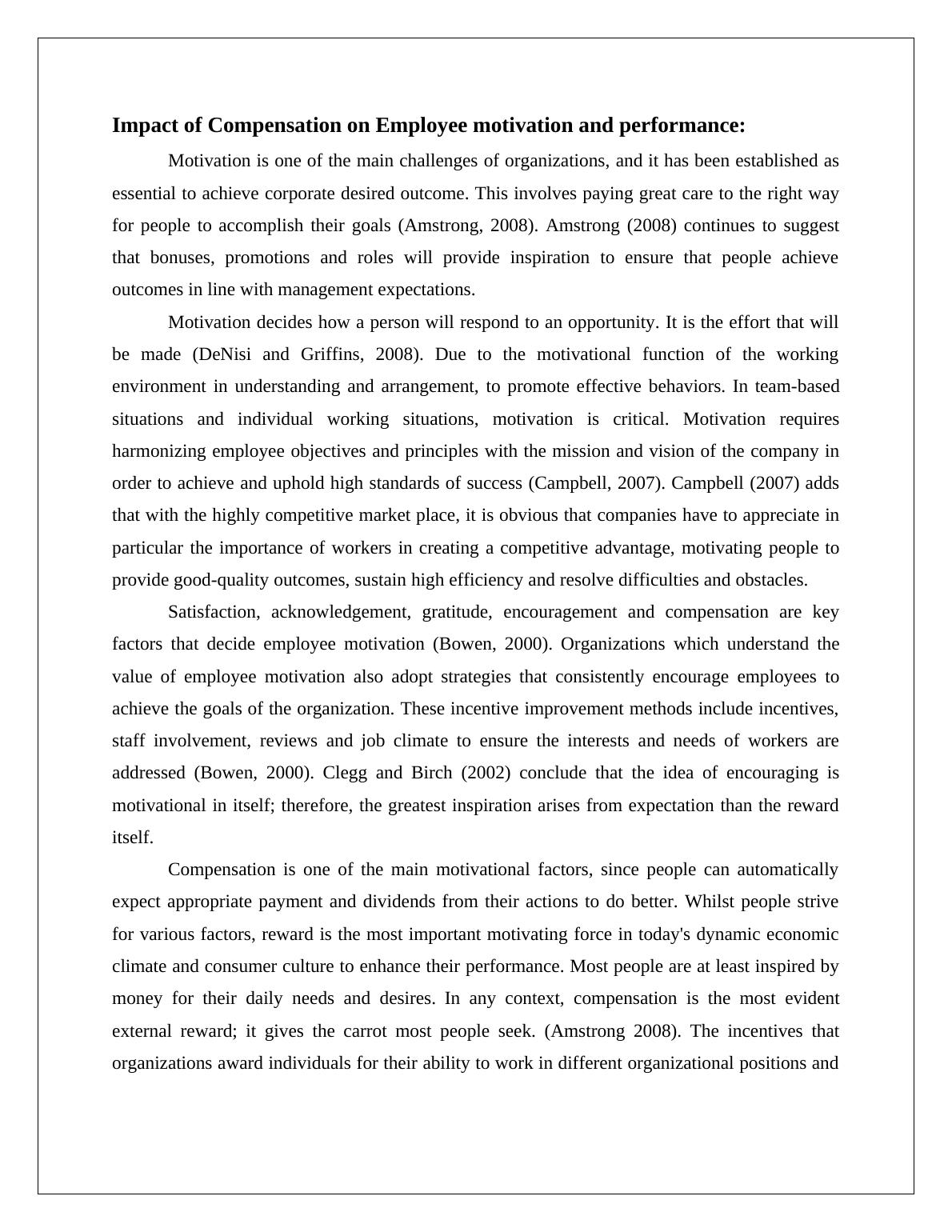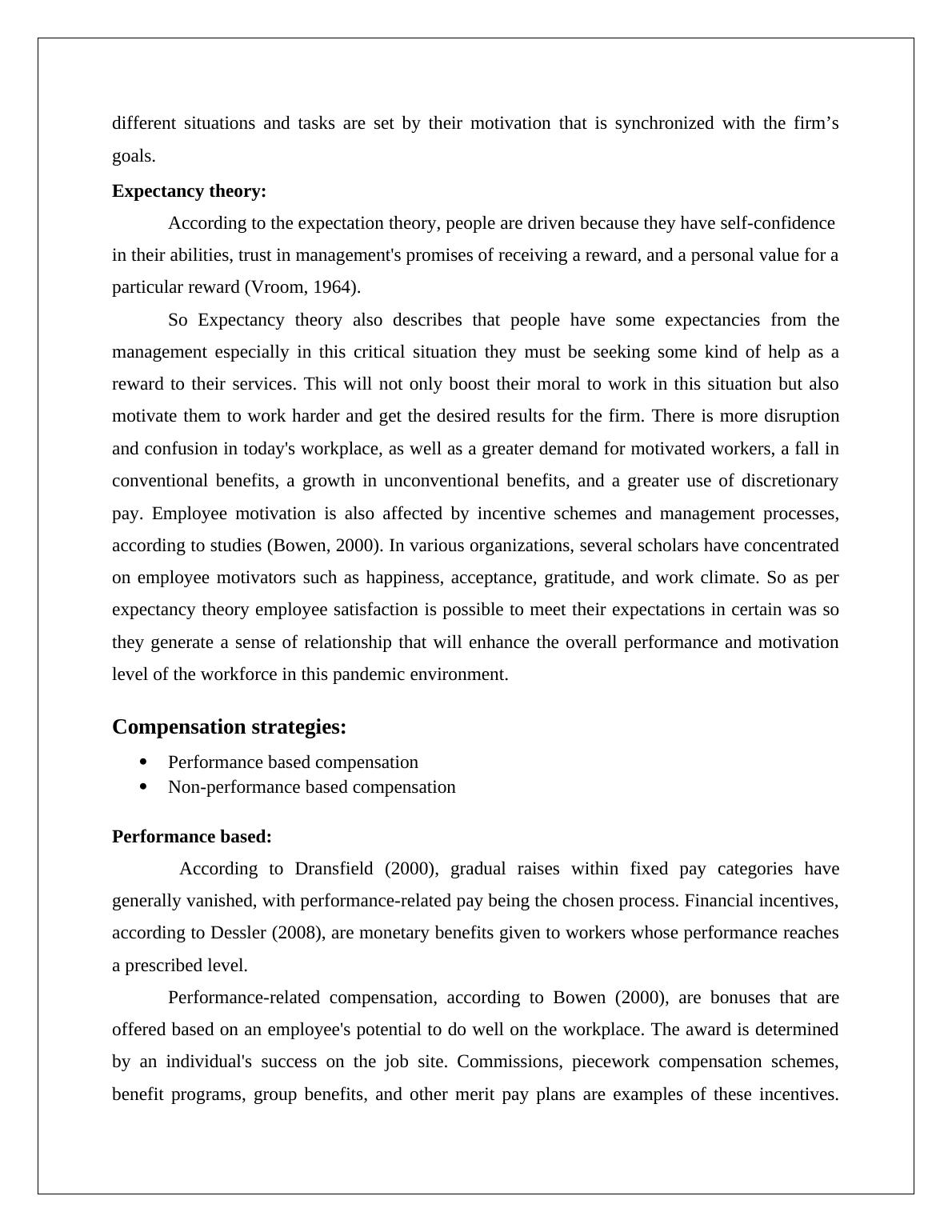Ask a question from expert
Impact of Compensation on Employee motivation and performance
8 Pages2720 Words112 Views
Added on 2021-07-23
Impact of Compensation on Employee motivation and performance
Added on 2021-07-23
BookmarkShareRelated Documents
Table of ContentsImpact of Compensation on Employee motivation and performance:........................................................2
Expectancy theory:..................................................................................................................................3
Compensation strategies:............................................................................................................................3
Performance based:................................................................................................................................3
Non-performance based:........................................................................................................................5
Market:................................................................................................................................................5
Retention:............................................................................................................................................5
Experience:..........................................................................................................................................5
Intangibles:..........................................................................................................................................5
Recommended Strategy:.............................................................................................................................6
Recommendations:.....................................................................................................................................6
Job analysis, pay structure and compensation:.......................................................................................6
Constructing job grades:..........................................................................................................................7
Calculating pay ranges:............................................................................................................................7
Compensable Factors:.............................................................................................................................7
Reference.................................................................................................................................................... 8
Expectancy theory:..................................................................................................................................3
Compensation strategies:............................................................................................................................3
Performance based:................................................................................................................................3
Non-performance based:........................................................................................................................5
Market:................................................................................................................................................5
Retention:............................................................................................................................................5
Experience:..........................................................................................................................................5
Intangibles:..........................................................................................................................................5
Recommended Strategy:.............................................................................................................................6
Recommendations:.....................................................................................................................................6
Job analysis, pay structure and compensation:.......................................................................................6
Constructing job grades:..........................................................................................................................7
Calculating pay ranges:............................................................................................................................7
Compensable Factors:.............................................................................................................................7
Reference.................................................................................................................................................... 8

Impact of Compensation on Employee motivation and performance:
Motivation is one of the main challenges of organizations, and it has been established as
essential to achieve corporate desired outcome. This involves paying great care to the right way
for people to accomplish their goals (Amstrong, 2008). Amstrong (2008) continues to suggest
that bonuses, promotions and roles will provide inspiration to ensure that people achieve
outcomes in line with management expectations.
Motivation decides how a person will respond to an opportunity. It is the effort that will
be made (DeNisi and Griffins, 2008). Due to the motivational function of the working
environment in understanding and arrangement, to promote effective behaviors. In team-based
situations and individual working situations, motivation is critical. Motivation requires
harmonizing employee objectives and principles with the mission and vision of the company in
order to achieve and uphold high standards of success (Campbell, 2007). Campbell (2007) adds
that with the highly competitive market place, it is obvious that companies have to appreciate in
particular the importance of workers in creating a competitive advantage, motivating people to
provide good-quality outcomes, sustain high efficiency and resolve difficulties and obstacles.
Satisfaction, acknowledgement, gratitude, encouragement and compensation are key
factors that decide employee motivation (Bowen, 2000). Organizations which understand the
value of employee motivation also adopt strategies that consistently encourage employees to
achieve the goals of the organization. These incentive improvement methods include incentives,
staff involvement, reviews and job climate to ensure the interests and needs of workers are
addressed (Bowen, 2000). Clegg and Birch (2002) conclude that the idea of encouraging is
motivational in itself; therefore, the greatest inspiration arises from expectation than the reward
itself.
Compensation is one of the main motivational factors, since people can automatically
expect appropriate payment and dividends from their actions to do better. Whilst people strive
for various factors, reward is the most important motivating force in today's dynamic economic
climate and consumer culture to enhance their performance. Most people are at least inspired by
money for their daily needs and desires. In any context, compensation is the most evident
external reward; it gives the carrot most people seek. (Amstrong 2008). The incentives that
organizations award individuals for their ability to work in different organizational positions and
Motivation is one of the main challenges of organizations, and it has been established as
essential to achieve corporate desired outcome. This involves paying great care to the right way
for people to accomplish their goals (Amstrong, 2008). Amstrong (2008) continues to suggest
that bonuses, promotions and roles will provide inspiration to ensure that people achieve
outcomes in line with management expectations.
Motivation decides how a person will respond to an opportunity. It is the effort that will
be made (DeNisi and Griffins, 2008). Due to the motivational function of the working
environment in understanding and arrangement, to promote effective behaviors. In team-based
situations and individual working situations, motivation is critical. Motivation requires
harmonizing employee objectives and principles with the mission and vision of the company in
order to achieve and uphold high standards of success (Campbell, 2007). Campbell (2007) adds
that with the highly competitive market place, it is obvious that companies have to appreciate in
particular the importance of workers in creating a competitive advantage, motivating people to
provide good-quality outcomes, sustain high efficiency and resolve difficulties and obstacles.
Satisfaction, acknowledgement, gratitude, encouragement and compensation are key
factors that decide employee motivation (Bowen, 2000). Organizations which understand the
value of employee motivation also adopt strategies that consistently encourage employees to
achieve the goals of the organization. These incentive improvement methods include incentives,
staff involvement, reviews and job climate to ensure the interests and needs of workers are
addressed (Bowen, 2000). Clegg and Birch (2002) conclude that the idea of encouraging is
motivational in itself; therefore, the greatest inspiration arises from expectation than the reward
itself.
Compensation is one of the main motivational factors, since people can automatically
expect appropriate payment and dividends from their actions to do better. Whilst people strive
for various factors, reward is the most important motivating force in today's dynamic economic
climate and consumer culture to enhance their performance. Most people are at least inspired by
money for their daily needs and desires. In any context, compensation is the most evident
external reward; it gives the carrot most people seek. (Amstrong 2008). The incentives that
organizations award individuals for their ability to work in different organizational positions and

different situations and tasks are set by their motivation that is synchronized with the firm’s
goals.
Expectancy theory:
According to the expectation theory, people are driven because they have self-confidence
in their abilities, trust in management's promises of receiving a reward, and a personal value for a
particular reward (Vroom, 1964).
So Expectancy theory also describes that people have some expectancies from the
management especially in this critical situation they must be seeking some kind of help as a
reward to their services. This will not only boost their moral to work in this situation but also
motivate them to work harder and get the desired results for the firm. There is more disruption
and confusion in today's workplace, as well as a greater demand for motivated workers, a fall in
conventional benefits, a growth in unconventional benefits, and a greater use of discretionary
pay. Employee motivation is also affected by incentive schemes and management processes,
according to studies (Bowen, 2000). In various organizations, several scholars have concentrated
on employee motivators such as happiness, acceptance, gratitude, and work climate. So as per
expectancy theory employee satisfaction is possible to meet their expectations in certain was so
they generate a sense of relationship that will enhance the overall performance and motivation
level of the workforce in this pandemic environment.
Compensation strategies:
Performance based compensation
Non-performance based compensation
Performance based:
According to Dransfield (2000), gradual raises within fixed pay categories have
generally vanished, with performance-related pay being the chosen process. Financial incentives,
according to Dessler (2008), are monetary benefits given to workers whose performance reaches
a prescribed level.
Performance-related compensation, according to Bowen (2000), are bonuses that are
offered based on an employee's potential to do well on the workplace. The award is determined
by an individual's success on the job site. Commissions, piecework compensation schemes,
benefit programs, group benefits, and other merit pay plans are examples of these incentives.
goals.
Expectancy theory:
According to the expectation theory, people are driven because they have self-confidence
in their abilities, trust in management's promises of receiving a reward, and a personal value for a
particular reward (Vroom, 1964).
So Expectancy theory also describes that people have some expectancies from the
management especially in this critical situation they must be seeking some kind of help as a
reward to their services. This will not only boost their moral to work in this situation but also
motivate them to work harder and get the desired results for the firm. There is more disruption
and confusion in today's workplace, as well as a greater demand for motivated workers, a fall in
conventional benefits, a growth in unconventional benefits, and a greater use of discretionary
pay. Employee motivation is also affected by incentive schemes and management processes,
according to studies (Bowen, 2000). In various organizations, several scholars have concentrated
on employee motivators such as happiness, acceptance, gratitude, and work climate. So as per
expectancy theory employee satisfaction is possible to meet their expectations in certain was so
they generate a sense of relationship that will enhance the overall performance and motivation
level of the workforce in this pandemic environment.
Compensation strategies:
Performance based compensation
Non-performance based compensation
Performance based:
According to Dransfield (2000), gradual raises within fixed pay categories have
generally vanished, with performance-related pay being the chosen process. Financial incentives,
according to Dessler (2008), are monetary benefits given to workers whose performance reaches
a prescribed level.
Performance-related compensation, according to Bowen (2000), are bonuses that are
offered based on an employee's potential to do well on the workplace. The award is determined
by an individual's success on the job site. Commissions, piecework compensation schemes,
benefit programs, group benefits, and other merit pay plans are examples of these incentives.

End of preview
Want to access all the pages? Upload your documents or become a member.
Related Documents
Motivation and Expectancy Theory in Organizational Behavior and Managementlg...
|8
|1730
|67
Essay Strategic Human Resource Management Assignmentlg...
|11
|3756
|146
Managing People in Organisation: Analysis, Recommendations, and Theorieslg...
|7
|1314
|37
Organization’s Rewards Plan and Effectiveness using OB Theorylg...
|5
|651
|450
Understanding Why People Worklg...
|11
|2322
|293
BB208 Managing People Presentation 2022lg...
|7
|1432
|16